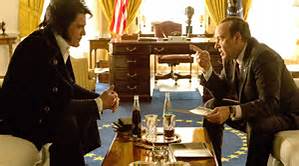
Let me begin by saying I didn’t expect much from this movie, especially since it is being pushed as a comedy. There was another movie made years ago on the topic, and if memory serves me correctly, it wasn’t very good. So, when I went to see the new film yesterday, I was surprised to find how much I enjoyed it. This is a lighthearted, feel good film from Amazon that does an amazing job of getting into both Nixon’s and Presley’s characters. In fact, I have to give a shout out to Michael Shannon: his is the best portrayal of Elvis I have seen in any film to date—short of Elvis himself of course, ha ha.
Shannon captured Elvis’s personality and charisma in a way that made me believe he was Elvis in the movie—not something easily accomplished when dealing with an Elvis fan of 50 years. And interestingly enough, it didn’t matter a bit to me that Shannon looks nothing like Elvis. I will be curious to hear whether other fans have a similar take, so if you’re reading this, please let me know via the comment section of this post.
As for Nixon, I did a tremendous amount of research on him for my book, Elvis Presley, Richard Nixon, and the American Dream (conveniently rereleased by my publisher back in November and currently available on Amazon, hint hint), and judging from all of that, I would say Kevin Spacey also did a fantastic job of playing Nixon. This was especially noticeable during the meeting with Elvis, when Nixon went from a grumpy old man irritated by Elvis taking up his time to fully enjoying his visit with the King. Having read so many books on Nixon including his own massive autobiography, I could totally envision him acting exactly that way.
As Shannon said during an interview on ABC, no documentation exists of the actual face-to-face meeting between the King and Nixon, so no one knows what happened behind closed doors until the photo shoot that happened at the end. Being quite familiar with both of their life stories, however, I found the script to be very believable. Elvis acted like Elvis and Nixon the same. Elvis’s amazing charisma could and probably did totally blow Nixon away. In the film, the two wind up chatting like a couple of old friends on the couch in the Oval Office, eating M&Ms and drinking Dr. Peppers.
There are some really funny scenes in this film, but I don’t think any of them are meant to make fun of Elvis in a mean spirited way, and that in itself is a real step forward for the mainstream media. Elvis was not your average, run of the mill celebrity. He lived life in the fast lane for the most part, but he was also a deeply spiritual, well-read, thoughtful individual who loved his country. Yes, it seems pretty crazy that he wanted a narcotics badge so he could become an undercover agent–but his thinking behind it, that he could infiltrate the Counterculture’s drug scene and help stop it–was certainly well meaning albeit pretty unlikely. Chances are Elvis knew that himself, but he had decided he wanted to meet the president of the United States and run it by him, just in case. As with most things Elvis, when all was said and done, it was mission accomplished.
.


